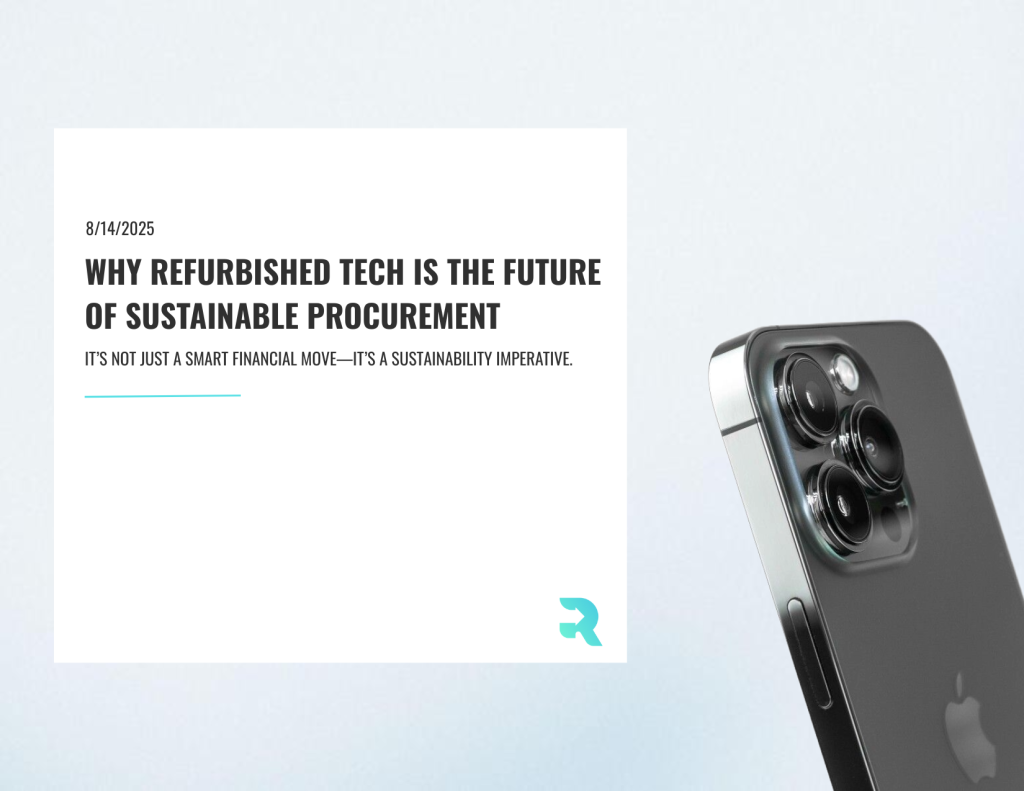It’s not just a smart financial move – it’s a sustainability imperative.
In a world where businesses are racing to decarbonize and optimize operations, refurbished technology has emerged as a powerful tool. Once viewed as a ‘second-tier’ option, it’s now reshaping how forward-thinking teams meet ESG targets, manage costs, and drive innovation.
At Refreshed Tech, we believe the future of procurement is circular. Here’s why.
The Environmental Cost of New Devices
The environmental impact of manufacturing new IT hardware is shocking… and often hidden.
- Manufacturing a single laptop generates an estimated 330 kg (728 lbs) of CO₂ emissions, most of it before it’s even turned on (ResearchGate).
- Smartphone production alone accounts for 85–95% of a device’s total lifecycle emissions (Green Peace).
- Mining rare earth materials like cobalt and lithium for new devices contributes to land degradation and water pollution, particularly in low-regulation regions.
Every time a company chooses a refurbished device over a new one, they eliminate the need for new raw materials and emissions-heavy production.
Extending Lifecycles, Reducing Waste
Refurbishment doesn’t just reduce new production – it also keeps working tech out of landfills.
- The world generated over 59 million metric tons of e-waste in 2022, yet only 17% was formally recycled (Unitar).
- IT departments often replace devices every 3-4 years, despite many systems being capable of 5-7+ years of effective performance when properly refurbished.
- A refurbished device extends the useful life of IT hardware by 2-4 years, delaying e-waste and maximizing return on embodied energy.
At Refreshed Tech, we test, repair, and re-certify devices to meet enterprise-grade performance standards – ensuring sustainability doesn’t mean sacrificing reliability.
The Financial & Carbon Advantage for Procurement Teams
Let’s talk bottom lines – because refurbished tech isn’t just good for the planet.
- Businesses save an average of 30–50% per unit when purchasing refurbished hardware vs. new.
- For every refurbished laptop deployed, a company can avoid up to 316 kg of CO₂e and save 190,000 liters of water, according to estimates from the Circular Electronics Partnership (Circular Computing).
These savings scale fast:
- A team of 500 employees using refurbished laptops could reduce over 150 metric tons of CO₂e—the equivalent of driving 370,000 fewer miles in a gasoline car.
And with ESG reporting and carbon accounting now top priorities, procurement teams are looking for solutions that deliver measurable carbon savings.
What About Performance & Security?
Let’s bust the myth: refurbished does not mean unreliable.
- All Refreshed Tech devices undergo multi-point diagnostic testing, hardware upgrades, and software resets.
- Devices can be configured to client spec, and often come with warranty protections that rival new equipment.
- From startups to Fortune 500s, companies are now standardizing refurbished tech as part of their IT fleet strategy.
Looking Ahead: The Circular Procurement Era
The shift is already happening:
- In 2024, Gartner predicted that 60% of large organizations will mandate circular IT practices in their procurement policies by 2026.
- The EU and several U.S. states are advancing Right to Repair laws, further opening doors for refurbishment adoption.
At Refreshed Tech, we see this not as a trend – but as a transformation. A way to align technology operations with climate goals, while delivering real financial and operational value.
Final Takeaway
Refurbished tech isn’t a compromise – it’s a competitive advantage.
It’s how sustainable procurement teams lower emissions, extend device value, and lead their organizations into a future where performance, responsibility, and savings coexist.
